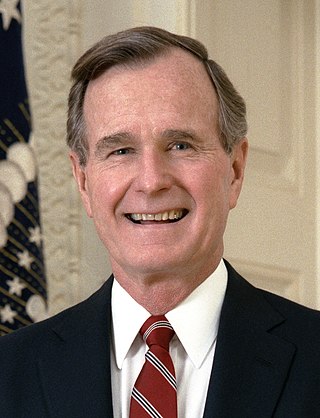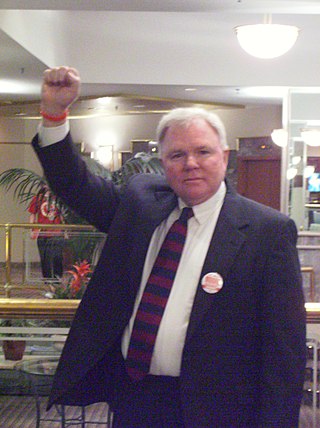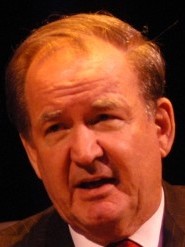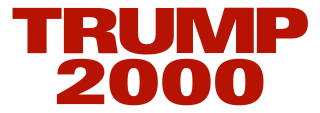Related Research Articles

Presidential elections were held in the United States on November 7, 2000. Republican nominee, Governor George W. Bush of Texas, the eldest son of George H. W. Bush, narrowly defeated incumbent Democratic Vice President Al Gore. It was the fourth of five U.S. presidential elections, and the first since 1888, in which the winning candidate lost the popular vote, and is considered one of the closest U.S. presidential elections, with long-standing controversy about the result. Gore conceded the election on December 13 after the Supreme Court issued its decision.

Presidential elections were held in the United States on November 3, 1992. Democratic governor Bill Clinton of Arkansas defeated incumbent Republican president George H. W. Bush and independent businessman Ross Perot of Texas. The election marked the beginning of a period of Democratic dominance and the end of a period of Republican dominance in American presidential politics that began in 1968, and also marked the end of 12 years of Republican rule of the White House, as well as the end of the Greatest Generation's 32-year American rule and the beginning of the baby boomers' decades-long dominance lasting through the present day.
Patrick Joseph Buchanan is an American paleoconservative author, political commentator, and politician. Buchanan was an assistant and special consultant to U.S. presidents Richard Nixon, Gerald Ford, and Ronald Reagan. He is an influential figure in the modern paleoconservative movement in America.

Prescott Sheldon Bush Sr. was an American banker and Republican Party politician. After working as a Wall Street executive investment banker, he represented Connecticut in the United States Senate from 1952 to 1963.A member of the Bush family, he was the father of President George H. W. Bush, and the paternal grandfather of President George W. Bush and former Florida Governor Jeb Bush.
The Union Banking Corporation (UBC) was a New York investment bank incorporated in 1924 in the United States. During World War II, under the U.S. Trading with the Enemy Act, the United States government seized the bank's assets pending investigation of the bank's business involving a former party member of the Nazi government in Germany, Fritz Thyssen. The now-former U.S. Senator Prescott Bush was a founding member and is included among its seven directors whose entire collective shareholdings in Union Banking Corp. were shares wholly owned by, and held on behalf of, the Thyssen empire's Bank voor Handel en Scheepvaart in Rottendam. [1]

Friedrich "Fritz" Thyssen was a German businessman, born into one of Germany's leading industrial families. He was an early supporter of the Nazi Party but later broke with it.

The 2000 presidential campaign of George W. Bush, the then-governor of Texas, was formally launched on June 14, 1999 as Governor Bush, the eldest son of former President George H. W. Bush, announced his intention to seek the Republican Party nomination for the presidency of the United States in the 2000 presidential election.

The New Hampshire presidential primary is the first in a series of nationwide party primary elections and the second party contest, the first being the Iowa caucuses, held in the United States every four years as part of the process of choosing the delegates to the Democratic and Republican national conventions which choose the party nominees for the presidential elections to be held in November. Although only a few delegates are chosen in the New Hampshire primary, its real importance comes from the massive media coverage it receives, along with the first caucus in Iowa.
This is a timeline of events during the 2004 U.S. presidential election.

Presidential elections were held in the United States on November 2, 2004. Incumbent Republican President George W. Bush and his running mate, incumbent Vice President Dick Cheney, were re-elected to a second term. They narrowly defeated the Democratic ticket of John Kerry, a senator from Massachusetts, and his running mate John Edwards, a senator from North Carolina.
David Emory is an American talk radio host and conspiracy theorist, born in New York City, based in the San Francisco Bay Area. Self-described "anti-fascist researcher", he is known for his radio show which purports to uncover neo-fascism and neo-Nazism; among his more notable claims is that the Bush family was connected to the Third Reich.

Presidential primaries and caucuses of the Republican Party took place within all 50 U.S. states and the District of Columbia between February 18 to June 9, 1992. The contests chose the 2,277 delegates sent to the national convention in Houston, Texas from August 17 to August 20, 1992, who selected the Republican Party's nominees for president and vice president in the 1992 United States presidential election and approved the party's platform. President George H. W. Bush was again selected as the nominee. The Republican ticket of President Bush and Vice President Dan Quayle went on to lose the general election to the Democratic ticket of Arkansas Governor Bill Clinton and Tennessee Senator Al Gore.
Eric Lichtblau is an American journalist, reporting for The New York Times in the Washington bureau, as well as the Los Angeles Times, Time magazine, The New Yorker, and the CNN network's investigative news unit. He has earned two Pulitzer Prizes for his work. He received a Pulitzer Prize in 2006 with the New York Times for his reporting on warrantless wiretapping by the National Security Agency. He also was part of the New York Times team that won the Pulitzer in 2017 for coverage of Russia and the Trump campaign. He is the author of Bush's Law: The Remaking of American Justice, and The Nazis Next Door: How America Became a Safe Haven for Hitler's Men.

Brian Patrick Moore is an American politician and founder of antiwar organization Nature Coast Coalition for Peace & Justice. A perennial candidate, he was the presidential nominee of the Socialist Party USA for the 2008 United States presidential election; he waged several campaigns for mayor and city council in Washington, D.C., and twice ran for the United States House of Representatives from Florida's 5th congressional district, winning none; he ran for the Democratic Party nomination for Governor of Florida in 2010, but lost in the primary election.
The 2008 presidential campaign of Tom Tancredo, a Congressman from Colorado began on April 2, 2007 with a formal announcement. The campaign garnered grassroots support and endorsements from conservative Republicans concerned about illegal immigration and border security. However, Tancredo remained low in the polls and was criticized for his nativist campaign, which had been described as "single-issued." Tancredo stated that he probably would not win the nomination but hoped his campaign would bring forth more debate on his issue of concern, immigration. On December 20, 2007 Tancredo withdrew from the presidential race, and endorsed Mitt Romney.

From January 29 to June 4, 1996, voters of the Republican Party chose its nominee for president in the 1996 United States presidential election. Senator Bob Dole of Kansas, the former Senate majority leader, was selected as the nominee through a series of primary elections and caucuses culminating in the 1996 Republican National Convention held from August 12 to 15, 1996, in San Diego, California. Dole resigned from the Senate in June 1996 once he became the presumptive nominee to concentrate on his presidential campaign. He chose Jack Kemp as his running mate.

Following Ross Perot's impressive showing during the 1996 presidential election, the Reform Party of the United States of America became the country's largest third party. The party's 2000 presidential candidate would be entitled to $12.5 million in matching funds. Several high-profile candidates vied for the nomination, including future President Donald Trump, Pat Buchanan, and physicist John Hagelin. For a brief time, Congressman John B. Anderson and Congressman Ron Paul, who previously ran third party campaigns for President in 1980 and 1988 respectively, were considered potential candidates. Both Anderson and Paul ultimately declined to seek the nomination.

Jerome Robert Corsi is an American conspiracy theorist and author. His two New York Times best-selling books, Unfit for Command (2004) and The Obama Nation (2008), attacked Democratic presidential candidates and have been criticized by opposition.

New York real estate magnate Donald Trump announced the creation of a presidential exploratory committee on the October 7, 1999, edition of Larry King Live on CNN. Although Trump had never held elected office, he was well known for his frequent comments on public affairs and business exploits as head of The Trump Organization. He had previously considered a presidential run in 1988 as a Republican, but chose not to run. For 2000, Minnesota Governor Jesse Ventura persuaded Trump to seek the presidential nomination of the Reform Party, which was fracturing despite achieving ballot access and qualifying for matching funds as a result of businessman Ross Perot's 1996 presidential campaign on the party's ticket.

The 2000 presidential campaign of Alan Keyes, former Assistant Secretary of State for International Organization Affairs from Maryland began when he formed an exploratory committee, simply called Keyes 2000, on June 17, 1999, with a formal announcement on September 21, 1999 in Bedford, New Hampshire. He ran in the 2000 presidential primaries, opposing Texas governor George W. Bush and Arizona Senator John McCain for his party's nomination. Keyes campaigned as a more ideologically consistent candidate than John McCain, taking right-wing positions on issues, including abortion, gun control, and government spending.
References
- ↑ New York Press , Who leads the '04 fringe candidates?
- 1 2 Campbell, Duncan (2004-09-25). "How Bush's grandfather helped Hitler's rise to power". The Guardian. London. Retrieved 2010-05-06.
- ↑ "John Buchanan Documents". History News Network. 2003-11-17. Retrieved 2007-10-19.
- ↑ Salant, Jonathan (2003-10-17). "Documents: Bush's Grandfather Directed Bank Tied to Man Who Funded Hitler". FOX News Network, LLC. Archived from the original on 2006-05-09. Retrieved 2007-10-19.
- ↑ Buchanan, John; Michael, Stacey (2003-11-07). ""Bush - Nazi Dealings Continued Until 1951" - Federal Documents". The New Hampshire Gazette. Archived from the original on 2003-11-19. Retrieved 2007-10-19.
- 1 2 Jonas, Jillian (January 25, 2004). "Challenge by 'honest Republican'". United Press International . Retrieved 2009-03-06.[ dead link ]
- ↑ Archive of John Buchanan.org On September 1, 2000, before Mr. Bush took office, the Project for a New American Century proposed the invasions, without provocation or attack, of Afghanistan and Iraq. The motive? 'to protect America's oil interests.' The signatories to that sinister plan - Dick Cheney, Paul Wolfowitz, and Richard Perle, to name but a few – cleverly and dishonorably set the stage for all that would follow, including the horrifying spectacle of 9/11, when they noted that since well-fed and materially-comfortable Americans would lack the will and focus to fight such 'interventionist' wars - now known as 'The Bush Doctrine' - there must be a galvanizing incident on the order of Pearl Harbor.
- ↑ Berg-Andersson, Richard (2004-01-27). "2004 Presidential Primaries, Caucuses, and Conventions". The Green Papers. Retrieved 2007-10-19.
- ↑ politics1.com, Archived July 9, 2009, at the Wayback Machine
- ↑ Poison pen or brave crusader? Small-town editor at odds with officials Atlanta Journal-Constitution Dec 18, 2005